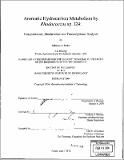Aromatic hydrocarbon metabolism by Rhodococcus sp. I24 : computational, biochemical and transcriptional analysis
Author(s)
Parker, Jefferson A. (Jefferson Alexander), 1974-
DownloadFull printable version (4.649Mb)
Other Contributors
Massachusetts Institute of Technology. Dept. of Biology.
Advisor
Anthony J. Sinskey.
Terms of use
Metadata
Show full item recordAbstract
Rhodococcus sp. 124 is a Gram-positive soil bacterium being developed for the manufacture of (-)cis-(1S,2R)-1-aminoindan-2-ol, a key precursor in the production of the HIV-1 protease inhibitor CrixivanTM, from the aromatic hydrocarbon indene. Rhodococcus sp. 124 was grown by batch fermentation in the presence of naphthalene and indene to measure changes in gene expression and aromatic hydrocarbon metabolism with DNA microarray technology. Genes were selected for microarray analysis based on functional annotation assignments made by the Consensus Annotation by Phylogeny Anchored Sequence Alignment (CAPASA) program, a high throughput system for automated functional annotation assignment of DNA sequence similarity search results. CAPASA was validated by comparison to several methods of annotation, and the agreement to other methods ranged from 75-94%. Microarray results were analyzed by the newly described method of trigonometric deconvolution, a mathematical system for the measurement of changes in gene expression across multiple growth conditions with a minimal number of hybridizations. The combined analysis of aromatic metabolism and gene expression reveal the differential expression of multiple polycyclic aromatic hydrocarbon dioxygenases in a substrate and growth phase dependent manner.
Description
Thesis (Ph. D.)--Massachusetts Institute of Technology, Dept. of Biology, 2004. Includes bibliographical references.
Date issued
2004Department
Massachusetts Institute of Technology. Department of BiologyPublisher
Massachusetts Institute of Technology
Keywords
Biology.